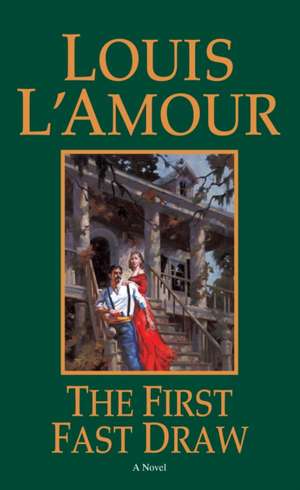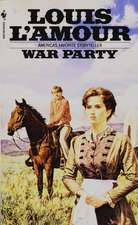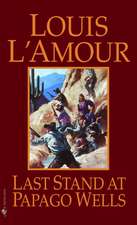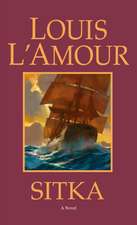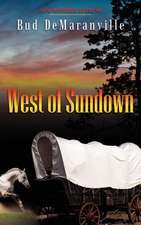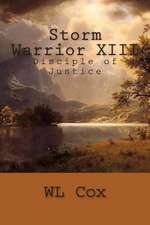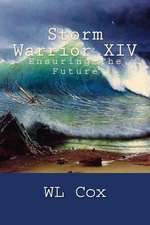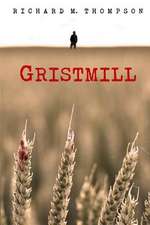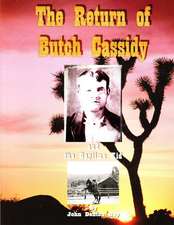The First Fast Draw
Autor Louis L'Amouren Limba Engleză Paperback – 31 ian 1985
East Texas wasn't much of a home for Cullen Baker. Few liked him, and some even tried to kill him. Yet after three hard years of wandering, he's come back to farm the land that's rightfully his.
Only Cullen's in for an unwelcome homecoming: his neighbors have long memories, the Reconstructionists have greedy hearts, and his worst enemy has teamed up with a vicious outlaw. But Cullen isn't about to back down. Instead, he's intent on perfecting a new way of gunfighting—the fast draw. And now, with enemies closing in on three sides and threatening the woman he loves, he'll have to be faster than lightning—and twice as deadly—just to survive.
Preț: 49.93 lei
Nou
Puncte Express: 75
Preț estimativ în valută:
9.55€ • 10.00$ • 7.91£
9.55€ • 10.00$ • 7.91£
Carte disponibilă
Livrare economică 15-29 martie
Livrare express 01-07 martie pentru 14.10 lei
Preluare comenzi: 021 569.72.76
Specificații
ISBN-13: 9780553252248
ISBN-10: 0553252240
Pagini: 156
Dimensiuni: 111 x 178 x 13 mm
Greutate: 0.1 kg
Ediția:New ed.
Editura: Bantam Books
Locul publicării:United States
ISBN-10: 0553252240
Pagini: 156
Dimensiuni: 111 x 178 x 13 mm
Greutate: 0.1 kg
Ediția:New ed.
Editura: Bantam Books
Locul publicării:United States
Notă biografică
LOUIS L’AMOUR is the only novelist in history to receive both the Presidential Medal of Freedom and the Congressional Gold Medal. He has published ninety novels; twenty-eight short-story collections; two works of nonfiction; a memoir, Education of a Wandering Man; and a volume of poetry, Smoke from This Altar. There are more than 300 million copies of his books in print.
Extras
Chapter One
WHEN THE SHELTER was finished, thatched heavy with pine boughs, I went inside and built myself a hatful of fire. It was a cold, wet, miserable time, and nowhere around any roof for me, although here I was, back in my own country.
Hungry I was, and soaked to the hide from a fall my mule had taken in the swamp, but I kept my fire small, for I'd come home by the back trails, figuring to attract no notice until I could look around and take stock.
They'd given me nothing here in the old days, and I'd given them a sight less, and the only memory they would have of me would be one of violence and anger. Yet hereabouts was all I had ever known of home, or was likely to know.
The woods dripped with rain. Sometimes a big drop would fall from the thatch overhead and hiss in the fire, but other than that and the soft fall of rain in the twilight forest, there was no sound. Not at first.
When a sound did come it was faint. But it was not a sound of the forest, nor of the rain, nor of any wild animal or bird, for these were sounds I knew and had known since childhood.
It was a rider coming, maybe two, and nobody I wanted to see, but that was why I'd put together my lean-to back over the knoll and hid down deep among the rain-wet trees.
This was a rider coming and I could only hope the rain had left no trail they could find, for if trouble was to come to me here, I wanted it to wait, at least until I had walked the old path to the well again, and seen where Pa was buried.
Standing there like that with the rain dripping down, me in my shabby homespun, wore-out clothes, I tried to figure if there was anybody hereabouts beyond a few Caddos whom I could call friend. I couldn't think of anybody.
For a long time then there was no other sound but the rain, a whisper of rain falling among the leaves, and a far-off stirring of wind. And then I heard that sound again.
Behind me the raw-boned mule lifted his head and pricked his ears against the sound, so it wasn't only me heard the sound. No matter, the buckskin mule was ga'nted some and it would be a few days of rest he'd need before I could move on anyway, and maybe I just wasn't feeling right to move at all. Maybe I had come home to stay . . . whether they liked it or not.
Rising, I could just see across the top of the knoll in the forest, and the place I'd chosen to camp commanded a view of the trail at intervals along its course through the swamp woods.
When at last they came in sight there were two riders and they rode as tired men ride, and there was that about them that was somehow familiar. Maybe it was only that they were mighty near as shabby as me, unkempt and lonely as me.
Two riders walking their horses, two riders hunting something. That something could be me.
My Spencer carbine was behind me and so I reached a hand back for it and pulled it close against my side for shelter from the rain. It was a new Spencer, caliber .56 and she carried seven shots-I'd picked it off a dead man up in the Nation. A brand-new, spanking-new, mighty slick piece of shooting iron.
Right there I stood with no notion of moving. Place I stood was a hidden place where a body might pass within six feet and never see it was there. Man like me, in unfriendly country, he can't be too careful. These past years I had seen almost nothing but unfriendly country. Maybe it was my own fault, for I was a man rode careful and who kept a gun to hand.
When I saw them first through the farthest gap in the trees, I'd seen nothing but a couple of men hunched in their saddles, one wearing a ragged poncho, the other a gray Confederate greatcoat.
A moment only, a glimpse, and then they were gone from sight among the trees that lined the trail below, but at the nearest point they would be no more than thirty yards away. So I waited where I was, trusting not to be seen, but keeping the Spencer to hand in case of trouble.
This was a place I knew, an arm of the swamp to protect my right flank, an almost impassable thicket of brush on my left, and the main swamp close in behind me. There was a trail came from the swamp into the trees behind me, but anyone using that trail was likely to be a Caddo or someone as averse to trouble as myself.
The brush on my left could be got through, no question of that, but not without a sight more noise than anybody was likely to make, coming easy to a strange camp.
The people of this northeast corner of Texas had not liked me before, and with times what they were they had no reason to be friendly. The War between the States was just over a few days past, and it was a wary time for strangers.
In the old days when a boy I'd taken nothing from them, nor given them anything they could lay hold on, they disliked me from the start because I wouldn't knuckle under to the town boys, and I'd met dislike with dislike, anger with anger, fist with fist. Despite the war that intervened they would not have forgotten.
Yet it was to this land that I'd come home, for it was as much of a home as I could claim, and despite the hard ways of the people toward me, it was a land I loved. From the deep silences of the forgotten swamp lagoons to the stillness of the fields at evening with the mist of night laying low along the fences, it was a place that belonged to me. There was a feel of things growing here, of a rich, dark soil bursting with eagerness to grow beneath my feet.
Those riders came along . . . there was something seemed familiar about them, but this corner of Texas had been a bloody country filled with black angers and feuding families, and now to the old hatreds there would be added the feeling left by the war just now ended. It was no country for a man to step out and go hailing strangers-least of all for me.
My tiny fire was over the top of the knoll from them and behind a great dead log, the side of the log serving as a reflector to throw heat back into the lean-to. It was snug and tight, and should have been, for I'd lived most of my life like this, and it was most two years since I'd slept beneath a roof of any decent kind. What little smoke the fire gave off lost itself among the leaves overhead, yet a knowing man with a keen nose might catch a whiff if the wind was right.
They drew up in the trail below, in plain sight and an easy shot for my rifle, and they talked there, and one of their voices had an old, familiar ring. So I stepped out of my shelter and strolled down the slope of the knoll toward them, walking soft on the dead wet leaves underfoot. The carbine was in my right hand and in my belt was a Dragoon Colt, within easy grasping.
"Bob Lee," I said aloud, and no louder than needed.
They turned sharp around, but it was to the more slender of the two whom I spoke. He looked at me, measuring me, then making up his mind.
What he was seeing wasn't much. A battered black slouch hat, a shabby buckskin jacket, squaw-made by a Ute west of the big mountains, with cabin-spun shirt and pants, mighty worn. My boots were Army issue, and the man in them a lean, dark young man standing two inches more than six feet in his socks, and weighing nigh two hundred pounds, but with the face of a man who had known much trouble and little of softness or loving-the face of a man born to struggle and the hard ways.
"Cullen, is it? Damn it, man, it's been years!"
"Three."
"I'd have guessed it longer. Bill Longley, meet Cullen Baker, such a man as we need right now in this country."
"I'll take no man's word for that," I said. "They'd no use for me before."
"You were a hard lad, Cullen. And once the trouble began you believed we were all against you, all over the five counties."
"Coffee yonder." I turned away, walking back up the knoll not wanting them to see how it moved me, the friendly way of them to a man just back in his own country, but where he'd expected nothing.
Bob Lee was a gentleman, a man of some book learning, a thin-faced man, and proud. He came of a family known in the South and respected, and the temper he had along with his skill with weapons and readiness to use them won him another kind of respect from another kind of man. Yet whatever anybody said of Bob Lee, nobody said anything except that he was an honorable man.
Bill Longley? He was eighteen then, a tall, raw-boned young man who in his time was to be known as one of the most feared of Texas pistol fighters, but that time was yet to come, and I'd only heard his name first up in the Nation, and I could not remember what had been said of him.
Hunkered down beside the fire, I stirred the coals and got out my cup. Each of them dug a blackened cup from among his gear and we shared the coffee in my beat-up old pot. Long ago Pa taught me to share what I had with guests if it was the last I had, although few had done the same for me.
"You're returning at a black time, Cullen. The Reconstruction people are in, confiscating property and raising hob generally with anyone who fought for the South. If they've not taken your place already, they'll be after it."
"They will buy trouble, then."
"Trouble is what they want, I'm afraid. They have the Army here, and more of it coming, and they've friends from about here to tell them the choice land."
"You've got to jump to their tune or you'll have to fight," Longley said.
"I've had enough of fighting," I replied. "I want no more of trouble from any man."
"Your wishes won't chop much cotton, Cullen. If you have what they want, they'll take it. And if you don't accept their rule with a tight mouth, you'll have trouble." Bob Lee glanced at me. "It has come to me already."
Rain fell among the leaves, and I'd a sorrow on me, and a deepening fury, too. Could a man not be left alone? There had been small chance in the old days for me to be anything but a bad one, although the Good Lord knows I'd wasted little time waiting for the invitation. When they came to me with trouble in those years, I was out there to meet them halfway.
A boy can be that way, but I was a man grown now, with a man's hard judgment, and some long miles behind me of riding with a gun for companion, through bitter, lonely days and more miles than I rightly could remember.
There was deep within me a love of the land, of a rich soil and what a man could grow, and over all those dry miles in the West I'd thought of the greens and beauties of this corner of Texas. I was back wanting no troubles left over from a war I'd never fought, nor had sympathy for, on either side.
Longley brought fuel to the fire and went off into the dark to strip the gear from the two horses and bring it under the shelter. Under the branches of the huge cypress where I'd picketed my mule there was room enough for a dozen horses, and mighty little rain came through the thick tangle of Spanish moss, leaves and branches. The horses would be dry enough.
The coffee smelled good, and the sound of rain was friendly now. Sitting there smelling the coffee I got to thinking how strange it was that Bob Lee, of all folks, should be a friend of mine. Not that we'd ever been close, only from the first he'd seemed to understand me. Maybe it was because we'd both had our fighting troubles.
Only he had education. His folks had wealth, and many friends. Time to time I'd heard talk of him during the War-he'd become a colonel, and a good officer. Now that he was home I could see it would not be easy for him with his fine pride, and even less easy for me.
Folks would not have forgotten Cullen Baker. They would remember, and that was handicap enough without trouble shaping up with Reconstruction soldiers and carpetbaggers. The ones from Texas could be the worst, poor whites and such; now they had their chance to strut and talk up, they'd use it.
All the way home I'd seen them coming like locusts into a cornfield, the poor kind of men quick to jump on the band wagon once they'd heard the music and knew which way the parade was going. In every community there are those quick to take advantage, just as there are those who have no loyalty except to their property and their skin's safety.
Sitting there, huddled over our small fire, we yarned the hours away, with Bob Lee telling about the war and the State of Texas, and what had happened and what he figured was going to happen. None of it shaped up as likely for a man named Cullen Baker, who'd be caught fair in the middle.
I'd no family awaiting me. Ma died long ago when I was a youngster, and Pa died while I was gone west. Nobody cared whether I came or went, but here I owned property, and here I aimed to stay, to raise me a crop, and to try to make something of myself.
This time I'd try to make it different than when we first came down from Tennessee. Maybe I could have avoided the first trouble, but I was a youngster then, and too proud. A really tough man never has to prove anything to anybody, he knows what he can do and he doesn't care even a mite whether anybody else knows or not. With a youngster it's otherwise. He figures he's got to show everybody how tough he is or nobody will believe it, so he winds up in plenty of grief.
--
WHEN THE SHELTER was finished, thatched heavy with pine boughs, I went inside and built myself a hatful of fire. It was a cold, wet, miserable time, and nowhere around any roof for me, although here I was, back in my own country.
Hungry I was, and soaked to the hide from a fall my mule had taken in the swamp, but I kept my fire small, for I'd come home by the back trails, figuring to attract no notice until I could look around and take stock.
They'd given me nothing here in the old days, and I'd given them a sight less, and the only memory they would have of me would be one of violence and anger. Yet hereabouts was all I had ever known of home, or was likely to know.
The woods dripped with rain. Sometimes a big drop would fall from the thatch overhead and hiss in the fire, but other than that and the soft fall of rain in the twilight forest, there was no sound. Not at first.
When a sound did come it was faint. But it was not a sound of the forest, nor of the rain, nor of any wild animal or bird, for these were sounds I knew and had known since childhood.
It was a rider coming, maybe two, and nobody I wanted to see, but that was why I'd put together my lean-to back over the knoll and hid down deep among the rain-wet trees.
This was a rider coming and I could only hope the rain had left no trail they could find, for if trouble was to come to me here, I wanted it to wait, at least until I had walked the old path to the well again, and seen where Pa was buried.
Standing there like that with the rain dripping down, me in my shabby homespun, wore-out clothes, I tried to figure if there was anybody hereabouts beyond a few Caddos whom I could call friend. I couldn't think of anybody.
For a long time then there was no other sound but the rain, a whisper of rain falling among the leaves, and a far-off stirring of wind. And then I heard that sound again.
Behind me the raw-boned mule lifted his head and pricked his ears against the sound, so it wasn't only me heard the sound. No matter, the buckskin mule was ga'nted some and it would be a few days of rest he'd need before I could move on anyway, and maybe I just wasn't feeling right to move at all. Maybe I had come home to stay . . . whether they liked it or not.
Rising, I could just see across the top of the knoll in the forest, and the place I'd chosen to camp commanded a view of the trail at intervals along its course through the swamp woods.
When at last they came in sight there were two riders and they rode as tired men ride, and there was that about them that was somehow familiar. Maybe it was only that they were mighty near as shabby as me, unkempt and lonely as me.
Two riders walking their horses, two riders hunting something. That something could be me.
My Spencer carbine was behind me and so I reached a hand back for it and pulled it close against my side for shelter from the rain. It was a new Spencer, caliber .56 and she carried seven shots-I'd picked it off a dead man up in the Nation. A brand-new, spanking-new, mighty slick piece of shooting iron.
Right there I stood with no notion of moving. Place I stood was a hidden place where a body might pass within six feet and never see it was there. Man like me, in unfriendly country, he can't be too careful. These past years I had seen almost nothing but unfriendly country. Maybe it was my own fault, for I was a man rode careful and who kept a gun to hand.
When I saw them first through the farthest gap in the trees, I'd seen nothing but a couple of men hunched in their saddles, one wearing a ragged poncho, the other a gray Confederate greatcoat.
A moment only, a glimpse, and then they were gone from sight among the trees that lined the trail below, but at the nearest point they would be no more than thirty yards away. So I waited where I was, trusting not to be seen, but keeping the Spencer to hand in case of trouble.
This was a place I knew, an arm of the swamp to protect my right flank, an almost impassable thicket of brush on my left, and the main swamp close in behind me. There was a trail came from the swamp into the trees behind me, but anyone using that trail was likely to be a Caddo or someone as averse to trouble as myself.
The brush on my left could be got through, no question of that, but not without a sight more noise than anybody was likely to make, coming easy to a strange camp.
The people of this northeast corner of Texas had not liked me before, and with times what they were they had no reason to be friendly. The War between the States was just over a few days past, and it was a wary time for strangers.
In the old days when a boy I'd taken nothing from them, nor given them anything they could lay hold on, they disliked me from the start because I wouldn't knuckle under to the town boys, and I'd met dislike with dislike, anger with anger, fist with fist. Despite the war that intervened they would not have forgotten.
Yet it was to this land that I'd come home, for it was as much of a home as I could claim, and despite the hard ways of the people toward me, it was a land I loved. From the deep silences of the forgotten swamp lagoons to the stillness of the fields at evening with the mist of night laying low along the fences, it was a place that belonged to me. There was a feel of things growing here, of a rich, dark soil bursting with eagerness to grow beneath my feet.
Those riders came along . . . there was something seemed familiar about them, but this corner of Texas had been a bloody country filled with black angers and feuding families, and now to the old hatreds there would be added the feeling left by the war just now ended. It was no country for a man to step out and go hailing strangers-least of all for me.
My tiny fire was over the top of the knoll from them and behind a great dead log, the side of the log serving as a reflector to throw heat back into the lean-to. It was snug and tight, and should have been, for I'd lived most of my life like this, and it was most two years since I'd slept beneath a roof of any decent kind. What little smoke the fire gave off lost itself among the leaves overhead, yet a knowing man with a keen nose might catch a whiff if the wind was right.
They drew up in the trail below, in plain sight and an easy shot for my rifle, and they talked there, and one of their voices had an old, familiar ring. So I stepped out of my shelter and strolled down the slope of the knoll toward them, walking soft on the dead wet leaves underfoot. The carbine was in my right hand and in my belt was a Dragoon Colt, within easy grasping.
"Bob Lee," I said aloud, and no louder than needed.
They turned sharp around, but it was to the more slender of the two whom I spoke. He looked at me, measuring me, then making up his mind.
What he was seeing wasn't much. A battered black slouch hat, a shabby buckskin jacket, squaw-made by a Ute west of the big mountains, with cabin-spun shirt and pants, mighty worn. My boots were Army issue, and the man in them a lean, dark young man standing two inches more than six feet in his socks, and weighing nigh two hundred pounds, but with the face of a man who had known much trouble and little of softness or loving-the face of a man born to struggle and the hard ways.
"Cullen, is it? Damn it, man, it's been years!"
"Three."
"I'd have guessed it longer. Bill Longley, meet Cullen Baker, such a man as we need right now in this country."
"I'll take no man's word for that," I said. "They'd no use for me before."
"You were a hard lad, Cullen. And once the trouble began you believed we were all against you, all over the five counties."
"Coffee yonder." I turned away, walking back up the knoll not wanting them to see how it moved me, the friendly way of them to a man just back in his own country, but where he'd expected nothing.
Bob Lee was a gentleman, a man of some book learning, a thin-faced man, and proud. He came of a family known in the South and respected, and the temper he had along with his skill with weapons and readiness to use them won him another kind of respect from another kind of man. Yet whatever anybody said of Bob Lee, nobody said anything except that he was an honorable man.
Bill Longley? He was eighteen then, a tall, raw-boned young man who in his time was to be known as one of the most feared of Texas pistol fighters, but that time was yet to come, and I'd only heard his name first up in the Nation, and I could not remember what had been said of him.
Hunkered down beside the fire, I stirred the coals and got out my cup. Each of them dug a blackened cup from among his gear and we shared the coffee in my beat-up old pot. Long ago Pa taught me to share what I had with guests if it was the last I had, although few had done the same for me.
"You're returning at a black time, Cullen. The Reconstruction people are in, confiscating property and raising hob generally with anyone who fought for the South. If they've not taken your place already, they'll be after it."
"They will buy trouble, then."
"Trouble is what they want, I'm afraid. They have the Army here, and more of it coming, and they've friends from about here to tell them the choice land."
"You've got to jump to their tune or you'll have to fight," Longley said.
"I've had enough of fighting," I replied. "I want no more of trouble from any man."
"Your wishes won't chop much cotton, Cullen. If you have what they want, they'll take it. And if you don't accept their rule with a tight mouth, you'll have trouble." Bob Lee glanced at me. "It has come to me already."
Rain fell among the leaves, and I'd a sorrow on me, and a deepening fury, too. Could a man not be left alone? There had been small chance in the old days for me to be anything but a bad one, although the Good Lord knows I'd wasted little time waiting for the invitation. When they came to me with trouble in those years, I was out there to meet them halfway.
A boy can be that way, but I was a man grown now, with a man's hard judgment, and some long miles behind me of riding with a gun for companion, through bitter, lonely days and more miles than I rightly could remember.
There was deep within me a love of the land, of a rich soil and what a man could grow, and over all those dry miles in the West I'd thought of the greens and beauties of this corner of Texas. I was back wanting no troubles left over from a war I'd never fought, nor had sympathy for, on either side.
Longley brought fuel to the fire and went off into the dark to strip the gear from the two horses and bring it under the shelter. Under the branches of the huge cypress where I'd picketed my mule there was room enough for a dozen horses, and mighty little rain came through the thick tangle of Spanish moss, leaves and branches. The horses would be dry enough.
The coffee smelled good, and the sound of rain was friendly now. Sitting there smelling the coffee I got to thinking how strange it was that Bob Lee, of all folks, should be a friend of mine. Not that we'd ever been close, only from the first he'd seemed to understand me. Maybe it was because we'd both had our fighting troubles.
Only he had education. His folks had wealth, and many friends. Time to time I'd heard talk of him during the War-he'd become a colonel, and a good officer. Now that he was home I could see it would not be easy for him with his fine pride, and even less easy for me.
Folks would not have forgotten Cullen Baker. They would remember, and that was handicap enough without trouble shaping up with Reconstruction soldiers and carpetbaggers. The ones from Texas could be the worst, poor whites and such; now they had their chance to strut and talk up, they'd use it.
All the way home I'd seen them coming like locusts into a cornfield, the poor kind of men quick to jump on the band wagon once they'd heard the music and knew which way the parade was going. In every community there are those quick to take advantage, just as there are those who have no loyalty except to their property and their skin's safety.
Sitting there, huddled over our small fire, we yarned the hours away, with Bob Lee telling about the war and the State of Texas, and what had happened and what he figured was going to happen. None of it shaped up as likely for a man named Cullen Baker, who'd be caught fair in the middle.
I'd no family awaiting me. Ma died long ago when I was a youngster, and Pa died while I was gone west. Nobody cared whether I came or went, but here I owned property, and here I aimed to stay, to raise me a crop, and to try to make something of myself.
This time I'd try to make it different than when we first came down from Tennessee. Maybe I could have avoided the first trouble, but I was a youngster then, and too proud. A really tough man never has to prove anything to anybody, he knows what he can do and he doesn't care even a mite whether anybody else knows or not. With a youngster it's otherwise. He figures he's got to show everybody how tough he is or nobody will believe it, so he winds up in plenty of grief.
--
Descriere
Today's foremost storyteller of the authentic West thrills western fans by brining to vivid life the brave men and women who settled the American frontier. Reissue.
